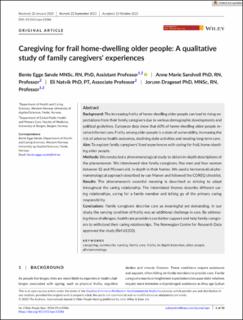Caregiving for frail home-dwelling older people: A qualitative study of family caregivers' experiences
Peer reviewed, Journal article
Published version
Permanent lenke
https://hdl.handle.net/11250/3125107Utgivelsesdato
2023Metadata
Vis full innførselSamlinger
- Import fra CRIStin [3581]
- Institutt for helse- og omsorgsvitskap [2721]
Originalversjon
10.1111/opn.12586Sammendrag
Background:
The increasing frailty of home-dwelling older people can lead to rising expectations from their family caregivers due to various demographic developments and political guidelines. European data show that 60% of home-dwelling older people receive informal care. Frailty among older people is a state of vulnerability, increasing the risk of adverse health outcomes, declining daily activities and needing long-term care.
Aim:
To explore family caregivers' lived experiences with caring for frail, home-dwelling older people.
Methods:
We conducted a phenomenological study to obtain in-depth descriptions of the phenomenon. We interviewed nine family caregivers, five men and four women between 52 and 90 years old, in-depth in their homes. We used a hermeneutical phenomenological approach described by van Manen and followed the COREQ checklist.
Results:
The phenomenon's essential meaning is described as striving to adapt throughout the caring relationship. The interrelated themes describe different caring relationships, caring for a family member and letting go of the primary caring responsibility.
Conclusions:
Family caregivers describe care as meaningful yet demanding. In our study, the varying condition of frailty was an additional challenge in care. By addressing these challenges, healthcare providers can better support and help family caregivers to withstand their caring relationships. The Norwegian Centre for Research Data approved the study (Ref.61202).

